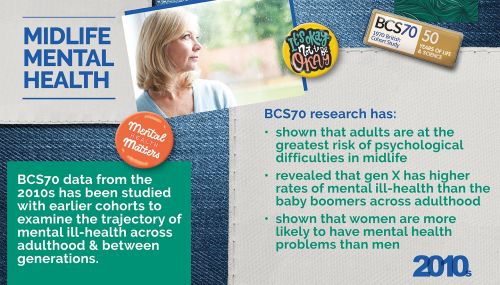
- Our studies
- Our research
- Publications and resources
- Data access and training
- About
- News
- Events
- Get in touch
- Join our mailing list


Mental ill-health has widespread and long lasting consequences for both individuals and society. The effect of poor mental health on physical illnesses is estimated to cost the NHS at least £8bn a year, and in 2015, mental health related issues were found to lead to more than 17 million days’ sick leave, costing the UK economy £25bn in lost GDP.
The 1970 British Cohort Study (BCS70) has been an important source of evidence on midlife mental health, helping to improve our understanding about why middle age is such a vulnerable period for adults.
Used in conjunction with similar studies of baby boomers born in 1946 and 1958, BCS70 has shown how psychological problems develop across people’s lives, and how rates vary between generations. For example, one group of researchers examined participants’ reports of their mental health between the ages of 23 and 69 to reveal that baby boomers and generation X were at greatest risk of psychological distress in midlife.
Among those born in 1958 and 1970, rates of mental ill-health decreased from their early 20s to their early 30s, then for all three cohorts, the prevalence of psychological distress increased from their early 30s to reach its highest levels in midlife. A fifth (20%) of those born in 1970, 19% of those born in 1946, and 15% of adults born in 1958, experienced symptoms of depression and anxiety in their 40s and 50s.
Across all three cohorts, at all ages, rates of psychological distress were higher among women than men. For example, in midlife, 23% of women taking part in BCS70 had mental health problems compared to 17% of men.
On a positive note, among those born in 1946, rates of psychological distress were observed to decline as they reached their 60s. Prevalence of mental ill-health decreased from 18% at age 60-64 to 15% at age 69.
A separate piece of research revealed that BCS70 study members were more likely than those born 12 years earlier to report symptoms of psychological distress at age 42, such as depression and anxiety.
The research found that the increase in mental health problems between the generations was steeper among men than women. For those born in 1958, 10% of men suffered from distress at age 42, compared to 16% of those born in 1970. Although women were more likely than men to report poor mental health in both generations, the rate rose less sharply for them – from 16% for those born in 1958 to 20% for those born 12 years later.
The study examined whether circumstances during early life and adolescence explained the differences between the two generations. In men, having conduct and emotional problems at age 16 and seeing parents divorce had a small effect in explaining the differences in psychological distress between the two groups in early middle age.
For women, never being breastfed, having a mother who smoked during pregnancy, as well as conduct and emotional problems at age 16, accounted for a small fraction of the differences in mental health between the two generations at 42.
Academics have suggested that middle-age is a particularly vulnerable period for mental health as adults tend to acquire increasing responsibility in their careers, which leads to reduced leisure time, and elevated job-related stress. Midlife is also often associated with changes to family structure, which may be linked with mental health. And, as people approach their 50s, they are also more likely to be parents and simultaneously care for ageing parents.
Researchers have also speculated on why members of generation X have higher rates of psychological distress than their predecessors. As they entered the labour market in the late 1980s and early 1990s during a period of high unemployment, and also found it more difficult to get on the housing ladder, this may have had a lasting effect on their mental health.
Because of evidence from BCS70, mental health practitioners understand more about the trajectory of psychological distress during adulthood, and periods when people are particularly at risk of mental health difficulties. As a result, increased attention should be paid to the detection and management of mental health in middle age, both by individuals themselves, and among health practitioners.
Information and advice on mental health is available at: https://www.nhs.uk/conditions/stress-anxiety-depression/
Read more:
Psychological Distress in Mid-Life: Evidence from the 1958 and 1970 British Birth Cohort
Ryan Bradshaw
Senior Communications Officer
Phone: 020 7612 6516
Email: r.bradshaw@ucl.ac.uk